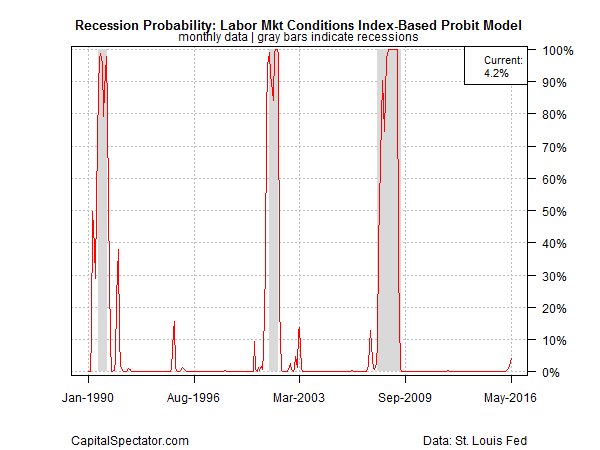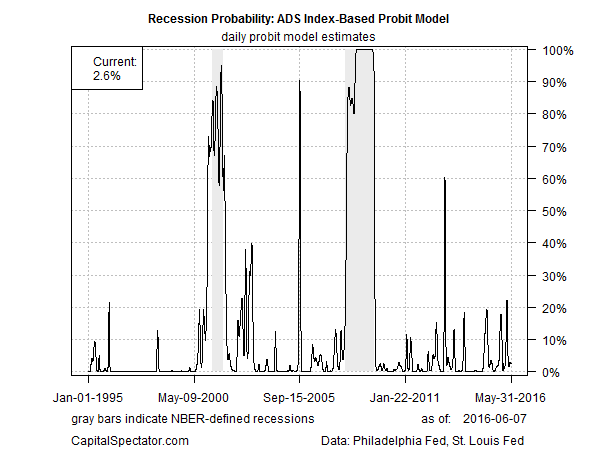The recent slowdown in job growth in the US will likely convince the Federal Reserve to forgo another interest rate hike at its June 14-15 policy meeting. But Fed Chair Janet Yellen kept the door open for squeezing policy at some point. “I see good reasons to expect that the positive forces supporting employment growth and higher inflation will continue to outweigh the negative ones,” she advised in a speech on Monday. “As a result, I expect the economic expansion to continue, with the labor market improving further and GDP growing moderately.”
Maybe so, but the Fed’s multi-factor benchmark of employment—the Labor Market Conditions Index (LMCI)—offered little support for anticipating firmer job growth in the months ahead. Indeed, LMCI slumped to a seven-year low in yesterday’s update for May. The index still falls short of issuing a clear-cut recession signal for the US economy, but LMCI’s ongoing slide this year confirms that the recent downshift in job growth isn’t a statistical mirage or the byproduct of one or two outlier months. Indeed, LMCI is calculated from 19 labor market indicators and so this benchmark offers a robust yardstick of the trend. Unfortunately, that trend is the weakest it’s been since the last recession via this measure.
Does that mean that a new NBER-defined recession has started? Maybe, but there’s still no smoking gun in the numbers overall. Short of speculating about what happens next, the worst you can say about the US macro trend is that forward momentum has weakened, including job-market growth. But based on the available data through May, which is still evolving, it’s still premature to make a formal recession call. That view conflicts with recent comments from the usual suspects, who tell us that the economy has already slipped over the edge. But if you’re looking for a reliable signal, the jury’s still out.
As I reminded subscribers over the weekend in The US Business Cycle Risk Report, a trustworthy recession signal will always arrive after the fact. If reliability is the main goal, as it is on these pages, then the focus is identifying, as early as possible, the onset of a new US recession while sidestepping the risk that the real time analysis is wrong.
That’s a delicate balancing act and one with many pitfalls and tradeoffs. The main risk is being misled by basing decisions on one or two indicators. For that reason, most US recession analysis should probably start by monitoring the three-month average of the Chicago Fed’s multi-factor benchmark of the business cycle. By that standard, the numbers through April still point to economic growth that’s well above the tipping point, as I discussed here. The Capital Spectator’s proprietary data echoes this view.
Yet it’s clear that risk is rising, and so perhaps the preliminary data for May marks a turning point. Then again, it could all be another head fake. In any case, we won’t know for sure until, at the earliest, the June economic profile is in hand. That’s going to take another one to two months of data updates. The early numbers for May, meanwhile, still imply that the macro trend didn’t slip over to the dark side, despite the deceleration in job growth last month.
Let’s get up to speed on the implied recession-risk probabilities via LMCI by running the numbers through a probit model, which analyzes the data in context with the historical record via NBER-defined recessions. As the chart below shows, the recession probability ticked higher in May, based on LMCI figures, but it remains low—just 4%.
The labor market is second to none in terms of economic relevance, but how does a broader set of data stack up for estimating macro risk? Let’s turn to the Philly Fed’s ADS Index, which tracks several indicators in addition to labor market indicators. Here, too, the implied recession-risk probabilities are low, based on data that covers economic activity through May 31.
None of this means that a recession won’t start soon. Perhaps a downturn is already underway, but the telltale signs aren’t yet visible in the numbers but soon will be when the data is revised. But if you’re reluctant to let speculation run your decisions about the state of the economy, it’s still prudent to refrain from judgement on whether the US expansion that began in mid-2009 has run out of juice.
Don’t misunderstand: this analysis isn’t set in stone. Rather, it’s a reasonable assessment based on numbers available as of this morning, June 7. But tomorrow, as Scarlet O’Hara famously advised, is another day.


